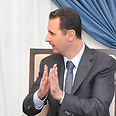
Assad: Syria will allow access to chemical sites
Syrian president says his government will allow international experts access to its chemical weapons sites but that rebels might block them from reaching locations
In an interview with Chinese state TV broadcast Monday, Bashar Assad said Damascus was dedicated to implement a Russia-US agreement to surrender its chemical weapons to international control.
He noted that though his government won't have "any problem" taking experts to sites where the weapons are kept and will allow international experts access to its chemical weapons sites, rebels might block them from reaching some of the locations.
Related stories:
- Lavrov: US 'blackmailing' Russia over Syria resolution
- Syria sends OPCW chemical weapons inventory
Russia: UN report on Syria gas attack 'biased'
Some places might be difficult to reach due to ongoing fighting or the "local security situation," the Syrian president added, stressing: "I'm referring to places where militants exist. Those militants might want to stop the experts' arrival."
Nevertheless, Assad denounced the United States, France and Britain for submitting a draft resolution to the UN Security Council to place Syrian chemical weapons under international control, saying they were fighting an "imaginary enemy".
Assad, who was interviewed by China's state television CCTV in Damascus, the Syrian capital, said he was not concerned about the draft resolution and that China and Russia would "ensure any excuse for military action against Syria will not stand."
An article posted on the CCTV website on Monday quoted Assad as saying, "I am not concerned. Since its independence, Syria has been committed to all the treaties it has signed. We will honor everything that we have agreed to do.
"And more importantly, I want to say, by submitting the draft to the UN Security Council, or by urging the US and Russia to agree on a deal, the US, France, and Britain are just trying to make themselves winners in a war against a Syria which is their imaginary enemy."
Russia and the United States brokered the deal to put Assad's chemical arms stockpiles under international control to avert possible US military strikes that Washington said would punish Assad for a poison gas attack last month.
Washington has blamed Assad's forces for the attack, which it said killed more than 1,400 people. Assad blamed rebels battling to overthrow him, saying it made no sense for his forces to use chemical weapons when they were gaining the upper hand and while UN chemical inspectors were staying in central Damascus.
Under the US-Russian deal, Assad must account for his chemical weapons stockpiles within a week and see them destroyed by the middle of next year.
Envoys from the five permanent members of the UN Security Council – the United States, Britain, France, Russia and China – met last Thursday for a third straight day to discuss a draft resolution Western powers hope will make the deal legally binding.
Russia, a key ally of Assad, is unhappy with the draft's references to possible punitive measures against Syria under Article 7 of the UN charter, which talks about UN authorization for sanctions and military force.
In the interview, Assad said gunmen could hinder the access of chemical weapons inspectors to sites where the weapons were stored and made.
He added, "We know that these terrorists are obeying the orders of other countries and these countries do drive these terrorists to commit acts that could get the Syrian government blamed for hindering this agreement."
Asked whether Syria had lots of chemical weapons, Assad said: "Syria has been manufacturing chemical weapons for decades so it's normal for there to be large quantities in the country.
"We are a nation at war, we've got territories that have been occupied for more than 40 years, but in any case, the Syrian army is trained to fight using conventional weapons."
He said the chemical weapons were stored "under special conditions to prevent any terrorist for other destructive forces from tampering with them, that is, destructive forces that could come from other countries."
"So there is nothing to worry about. The chemical weapons in Syria are in a safe place that is secure and under the control of the Syrian army."
Separately, China's Foreign Minister Wang Yi told UN Secretary General Ban Ki-moon that China was willing to send experts to help in the Syrian chemical weapons destruction process, and reiterated that a political solution was the only way to solve the crisis in Syria.
The Organization for the Prohibition of Chemical Weapons (OPCW) said on Saturday Syria had handed over information about its chemical weapons arsenal, meeting the first deadline of the disarmament operation.
- Receive Ynetnews updates directly to your desktop










